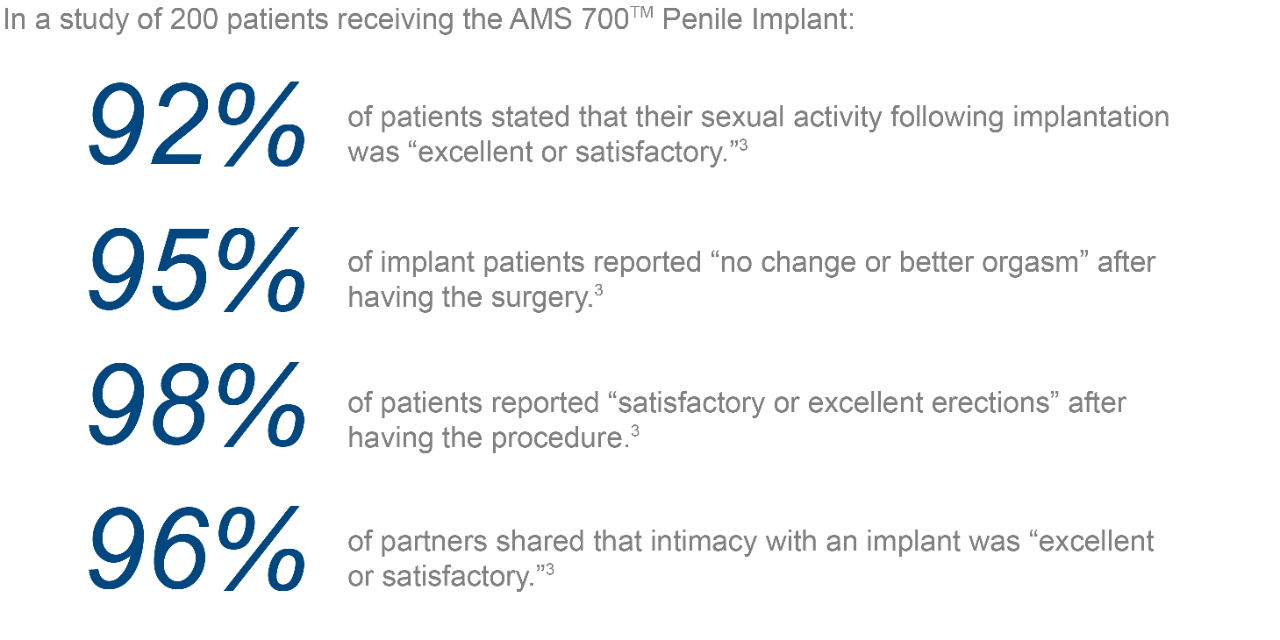One study evaluated the general level of knowledge, attitudes and referral practices in regards to prosthetic implants among general medical practitioners in both academic and community practice settings via a confidential questionnaire. Here are the common misconceptions reported.
Misconception: Patient or partner satisfaction rates with penile implants are low
The study mentioned above reported that 77% of respondents believed patient satisfaction rates for implant surgery were around 30%.1
FACT: The penile implant mimics a natural erection. The cylinders inside the corporal bodies inflate with saline to create a hard, firm erection that lasts as long as the patient wants. In the deflated state, the patient appears natural and is completely concealed discretely within the body.
The penile implant typically doesn’t interfere with orgasm or ejaculation.2
Misconception: Infection rates are high for implants
In the study referenced above, 62% of respondents said they would not recommend penile implant surgery due to a perceived infection rate higher than 25%.1
FACT: The AMS 700 Penile Implants are impregnated with a proprietary combination of minocycline and rifampin, called InhibiZone™ Antibiotic Surface Treatment. This antibiotic surface treatment has been proven to reduce infection rates to 1% in original procedures.4,5
The AMS 700 is the only penile implant on the market proven to reduce the rate of revision due to infection in original implant procedures, in revision procedures and in patients with diabetes. Based on the extensive clinical literature, the FDA has approved 10 claims regarding infection prevention only for the AMS 700 Penile Implant.6
Misconception: Implant malfunction rates are high
More than two thirds of the respondents in the study regarding penile implant knowledge believed a majority of penile implant cylinders needed to be replaced within 5 years due to malfunction, infection or other complications. Furthermore, respondents demonstrated an exaggerated concern for complications and side effects for the penile procedures in the setting of diabetes and heart disease.1
FACT: The AMS 700 Penile Implant is durable and can last patients for many years. The implant is made of silicone and coated with parylene to mitigate cylinder fatigue and wear.7
According to a clinical review of over 55,000 implants, the 7 year mechanical failure free survival rate for the AMS 700 was 94.1% (p<0.0001).8
In a series spanning two decades of 2,384 first time penile implants, 10 and 15 year revision-free survival for all reasons was 68.5% and 59.7% respectively. The 10 and 15 year estimates for freedom from mechanical breakage was 79.4% and 71.2% respectively. Enhanced models of the implants did better. In 2001, the addition of parylene coating increased the AMS 700 cylinder 3 year mechanical survival from 88.4% to 97.9% (p=0.0002). The study concluded that there is a 60% chance a first time implant would survive 15 or more years without revision or extraction.9
Infection rates with the AMS 700 with InhibiZone Treatment are around 1% as mentioned above.4,5 In patients with diabetes who may be at higher risk for infection, the AMS 700 penile implant with InhibiZone had very low infection rates compared to Non-InhibiZone coated implants in 6,695 patients. (1.47% vs. 4.17%)10
The AMS 700 Penile Implant is the ONLY implant with FDA claims supporting the reduction in the rate of revision due to infection.6
Resources from EDCure.org
If you have a patient that is considering a permanent treatment for his ED, don’t hesitate to discuss penile implants as an option.
For additional FAQ’s your patients may have about ED, penile implants, insurance questions or to find an ED Specialist in your area, encourage them to visit EDCure.org.


